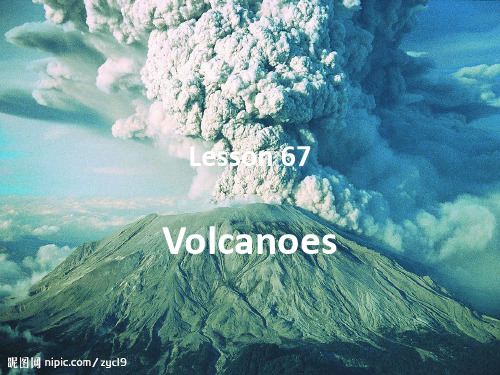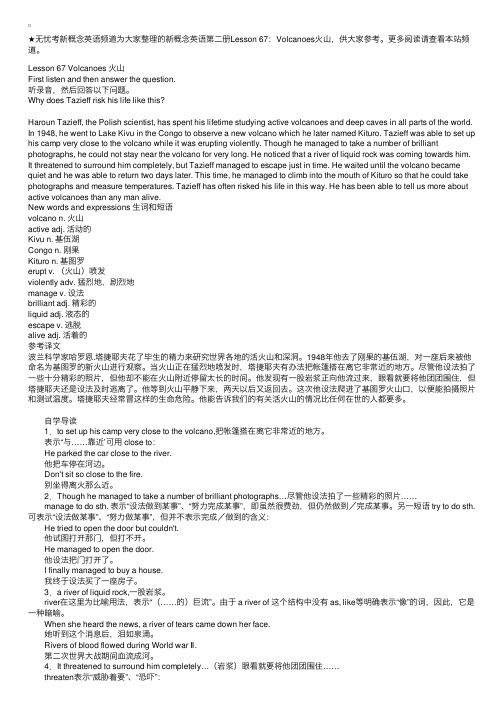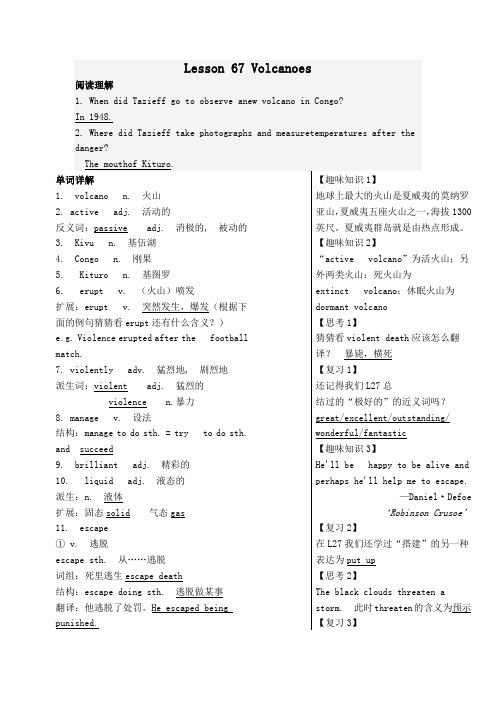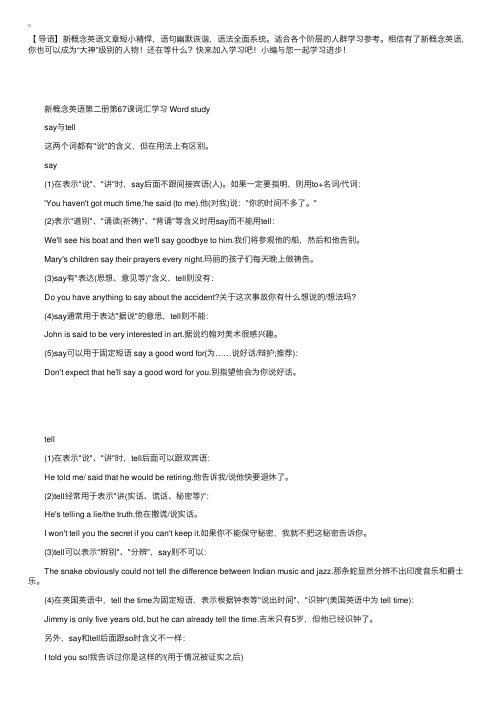新概念英语第二册笔记_第67课
新概念2 第67课

.
• Observe • 1)v. 观察,观测,注意看 • 注意看我怎样做 (这件事)
• Observe how I do this [how to do this].
• 2)v. 遵守<规则等>; 保持 • 遵守交通规则
• observe the traffic regulations
.
• Set up 竖立,架起;创立,建 立
• 他们竖起一些石头当界碑。
• They set up some stones as land marks.
• 在他17岁的时候就创立了一家公 司。
• He set up a company when he is only 17 years old..
.
• a river of… ……形成的河流 • a river of soil and stone • 泥石流 • 在二战中,血流成河。 • Rivers of blood flowed during World war II. • 当她听说了这个消息,眼泪如河水般从她脸上
• close to 离……很近,与……靠 近
• 他把车停到靠近河边的地方。 • He parked the car close to the
river. • 不要坐的离火太近。 • Don’t sit so close to the fire.
.
• Manage to do sth 设法做成某事
punished. • ② n. 逃脱 • narrow escape 九死一生 • 今年我们有三起越狱事件 • We had three escapes from the prison
新概念英语67课讲义资料讲解

新概念英语67课讲义Lesson 67 the weekend 周末一、单词与短语greengrocer: n.蔬菜水果零售商;absent:adj.缺席的,重要短语:be absent from:缺席、、、、He was absent from school last week.上周他没上学。
keep: v.(身体健康)处于(状况),保持、、、keep doing sth:一直做、、、或者是不停地做、、、、;keep knocking the door:一直敲门;spend:v.度过;spend a weekend:度周末;weekend:v.周末;country:n.国家;乡村;lucky: adj.幸运的;luck:n.幸运,机遇。
Monday:n,星期一;Tuesday:n.星期二;Wednesday:n.星期三;Thursday:n.星期四;Friday: n.星期五;Saturday: n.星期六;Sunday: n.星期日;在星期几前边一般加介词on,如:on Monday:在周一;On Sunday:在周日;二、短语、句型与语法1、Were you at the butcher′s?刚才您在肉店里吗?Yes, I was. 是的,我在。
在本句中,需要注意的一个知识点:在英文表示某一种商店的短语中,shop这个词往往可以省略,如文中的the butcher′s 其实就是the butcher′s shop的省略,另外像文中的the greengrocer′s 其实就是 the greengrocer′s shop 的省略,另外的例子还有the hairdresse r′s (shop )等等,shop 的省略不影响句义,就是一种表达的习惯。
2、how is jimmy today?吉米今天怎么样?在本句中我们继续复习关于询问人或事物状况的几个重要的句型:How is/are+主语、、、怎么样?例:How are you today?你今天可好?How is Tom today?汤姆今天可好?另外What is the matter with、、、?经常用来询问人和事物的状况,常作“是否有问题”“是否有麻烦讲”例如:What is the matter with Tom?汤姆怎么了啊?What is the matter with this bike?这辆自行车怎么了啊?What is the matter with the book?这本书怎么了?3、Was he absent from school last week?上周他没上学吧?在本句中需要掌握一个重点短语的用法:be absent from:缺席、、、例:He is absent from the meeting since he is ill.他今天缺席会议是因为他病了。
新概念英语第二册Lesson67课堂讲义

生词讲解1)Volcano 火山引申earthquake 地震seaquake海啸flood洪水2)Liquid液态的引申solid gas3)Escape 词组escape (from) doing sth 例句:He escape punishment/(from)being punished. 语法点讲解(语法全出自课文原句):1)take spend cost pay 表示花费时候的区别Spend:a)spend time/money (in)doing sth/ on sth spend主语是人,在。
上花费的钱/时间Eg: I spent two hours on this math problem.b)Spend money for sth 花钱买。
Eg:His money was spent for books.Cost:主语是物或某种活动,还可以表示“值”。
a)Sth costs sbEg: A new computer costs a lot of money.It cost me 2 hours to finishTake:后面常跟双宾语It takes sb+时间+to do sthEg: It took me 2 hours to finishPay:Pay (sb) money for sth /doing sthPay for sth /doing sth总结:用it作主语只能用take或者cost,用人作主语一般用spend或者pay做题选择题8(D)做选择题14(D)题目8让同学们改写成pay take cost的形式2)When 和while的区别a)引导时间状语从句When:at or during the time that 既指时间点也可以指一段时间While: during the time that 只能指一段时间所以while引导时间状语从句只能跟延续性动词Eg:I was reading a book while(when) he was knocking at the door.I was reading a book when while he got home.如果主句从句动词同时发生,且都是过去进行时,一般用while(上一行第一个例子)b)While表示转折(然而,却)He is smart while his brother is stupid.3)Close to = near to 靠近Close和closely 都可以作副词Close 接近(距离近)My friend and I live closeClosely 亲密(关系近)My friend and I are closely.做选择题7(C)4)Notice用法a)Notice that+宾语从句(课文原句He noticed that a river of liquid rock was comingtowards him)b)Notice sthEg: She noticed the beautiful butterfly.c)Notice sb do/doing sth 注意到某人做某事/正在做某事Eg: He noticed a river of liquid rock coming towards him做题选择题3(C)做选择题5(D)填空题6(Rivers of blood)选择题3中tear一般作为复数形式出现,water不可数tear可数,原因和trousers裤子pants短裤一样,裤子有两条裤腿所以复数,眼泪从两眼出来所以也是复数。
新概念英语第二册lesson67讲解

lesson 67volcano n 火山active adj 活动的Kivu n 基伍湖Congo n 刚果Kituro n 基图罗erupt n (或山)喷发violently adv 猛烈地,剧烈地manage v 设法brilliant adj 精彩的liquid adj 液态的escape v 逃脱alive adj 活着的active:积极的passive:消极的,被动的violent(adj)manage to doi can manage itescape death:死里逃生narrow escape:九死一生escape doing sthalive 做定语时一定要放在被修饰词后面living sthlive(adj):现场的;表“活着的”永远不和人连用个人收集整理勿做商业用途textHaroun Tazieff the Polish scientist, hasspent his life-time studying active vol-canoes and deep caves in all parts of theworld. In 1948, he went to lake Kivu inthe Congo to observe a new volcanowhich he later named Kituro. Tazieff wasable to set up his camp very close to thevolcano while it was erupting violently.Though he managed to take a number ofbrilliant photographs, he could not staynear the volcano for very long. Henoticed that a river of liquid rock wascoming towards him. It threatened to sur-round him completely, but Tazieff man-aged to escape just in time. He waiteduntil the volcano became quiet and he wasable to return two days later. This time, he managed to climb into the mouth of Kituro so that he could take photographs and measure temperatures. Tazieff hasoften risked his life in this way. He has been able to tell us more about active volcanoes than any man alive. 个人收集整理勿做商业用途spend some time doing sth用不定式做目的状语close to:离......很近for long=for a long timenotice sthnotice sb do/doingnotice thatriver of...:......形成的河流threaten to:有迹象表明take a risk of/at a risk of:冒险risk sth=risk losing sth:冒着失去......的危险risk doing:冒着做......的危险在两相比较中,如果前者属于后者,那一定要在比较时用other,else排除前者special difficulties个人收集整理勿做商业用途say sthtell sb sthtell the timewhat time is it?/what's the time?/can you tell mewhat time it is?tell the difference betweentell(sb)a lietell(sb)the truthsay a good word for sb:为某人说好话个人收集整理勿做商业用途multiple choice questions4、only just=almost not7、on the subject of=abouttowards=in the direction of个人收集整理勿做商业用途。
Volcanoes 火山-新概念英语第二册自学导读笔记第67课

Volcanoes 火山-新概念英语第二册自学导读笔记第67课新概念英语第二册第67课课文重难点 further notes on the text1.to set up his camp very close to the volcano,把帐篷搭在离它非常近的地方。
表示"与……靠近'可用 close to:he parked the car close to the river.他把车停在河边。
don't sit so close to the fire.别坐得离火那么近。
2.though he managed to take a number of brilliant photographs…即使他设法拍了一些精彩的照片……manage to do sth. 表示"设法做到某事"、"努力完成某事",即虽然很费劲,但仍然做到/完成某事。
另一短语 try to do sth. 可表示"设法做某事"、"努力做某事",但并不表示完成/做到的含义:he tried to open the door but couldn't.他试图打开那门,但打不开。
he managed to open the door.他设法把门打开了。
i finally managed to buy a house.我终于设法买了一座房子。
3.a river of liquid rock,一股岩浆。
river在这里为比喻用法,表示"(……的)巨流"。
因为 a river of 这个结构中没有 as, like等明确表示"像"的词,所以,它是一种暗喻。
when she heard the news, a river of tears came down her face.她听到这个消息后,泪如泉涌。
新概念英语第二册课后题答案详解:Lesson67

新概念英语第二册课后题答案详解:Lesson67新概念英语第二册课后习题Lesson 671. d根据课文第2-3行 In 1984, he went to lake Kivu in the Congo to observe a new volcano which 能够看出只有d. to investigate a new volcano (调查一座新火山)与课文的内容相符,其他3个选择都与课文的实际情况不符,所以选d.2. a根据课文第9-10行…but Tazieff managed to escape…Hewaited until the volcano became quiet and he was able toreturn two days later 能够判断,只有a. and Tazieff had to leave but he returned later 与课文的实际情况相符,其他3个选择都与课文的实际情况不符,所以选a.3. d前一句中的managed to 表示“成功地完成了的动作”,本句需要对这个动词作解释说明。
a. might have taken (本来应该做);b.could have taken (本来能够做);c. should have taken (本应该做);这3个选择含义相同都表示“过去该做,但却没做”,与managed to 含义不同。
只有 d. succeeded in taking 与 managed to 意思相同,所以选d.4. d前一句he escaped just in time 意思为“他刚好即时逃离了。
”句中的just 是表示强调语气的副词,它的含义是“正好”,“勉强地”,本句是对前一句的进一步解释。
a. just only 的意思不通;b. only (仅仅,仅仅)与前一句含义不符;c. soon (不久,很快)与前一句意思不符;只有d. only just (仅仅勉强地)与前一句含义相符,所以选d.5. d该句的动词waited(等待)是不及物动词,后面只能跟for引导的短语。
新概念英语第二册 Lesson67

• ①notice sth. • ②notice sb. do 注意到某人做某事 • ③notice sb. doing 注意到某人正在做某事 • ④notice that + 宾语从句 • 我们不用notice that这个句型,可改为—
• He notice a river of liquid rock coming towards
• He escape being punished.
• 他逃避了被惩罚的命运
• ★alive adj 活着的
• 以字母a开头的形容词往往是表语形容词,表 语形容词做定语时,一定要放在被修饰词后面。 如: 前面的灯光light ahead。
• 表示活着的什么东西,一定是sth. alive.如果想 放在被修饰词的前面,用living。living为定语 形容词。living sth.
eruption [I‘rʌpʃən] n. 爆发
Words and expressions:
violent adj.激烈的
The earthquake was extremely violent.
violently adv. 激烈地,猛烈地 violence n.暴力
There is too much violence on TV.
• ★manage v 设法 • ①manage to do 设法做某事
• = try to do sth. • = succeed in doing sth. • I try to pass the exam.
• 我尽力通过考试(结果不知道)
• I manage to pass the exam.
益处:地热、温泉 、制造陆地 、地球天然的气候调整机制
新概念英语第二册逐句精讲语言点第67课(2)

新概念英语第二册逐句精讲语言点第67课(2)Lesson 67: Volcanoes 火山Haroun Tazieff, the Polish scientist, has spent his lifetime studying active volcanoes and deep caves in all parts of the world. In 1948, he went to Lake Kivu in the Congo to observea new volcano which he later named Kituro. Tazieff was ableto set up his camp very close to the volcano while it was erupting violently. Though he managed to take a number of brilliant photographs, he could not stay near the volcano for very long. He noticed that a river of liquid rock was coming towards him. It threatened to surround him completely, but Tazieff managed to escape just in time. He waited until the volcano became quiet and he was able to return two days later. This time, he managed to climb into the mouth of Kituro sothat he could take photographs and measure temperatures. Tazieff has often risked his life in this way. He has beenable to tell us more about active volcanoes than any man alive.句子讲解:4、Though he managed to take a number of brilliant photographs, he could not stay near the volcano for very long.即使他设法拍了很多十分精彩的照片,但他却不能在火山附近停留太长时间。
Lessons 67新概念英语第二册课后答案详解

Lessons 67新概念英语第二册课后答案详解新概念英语第二册第67课词汇学习 Word studysay与tell这两个词都有"说"的含义,但在用法上有区别。
say(1)在表示"说"、"讲"时,say后面不跟间接宾语(人)。
如果一定要指明,则用to+名词/代词:'You haven't got much time,'he said (to me).他(对我)说:"你的时间不多了。
"(2)表示"道别"、"诵读(祈祷)"、"背诵"等含义时用say而不能用tell:We'll see his boat and then we'll say goodbye to him.我们将参观他的船,然后和他告别。
Mary's children say their prayers every night.玛丽的孩子们每天晚上做祷告。
(3)say有"表达(思想、意见等)"含义,tell则没有:Do you have anything to say about the accident?关于这次事故你有什么想说的/想法吗?(4)say通常用于表达"据说"的意思,tell则不能:John is said to be very interested in art.据说约翰对美术很感兴趣。
(5)say可以用于固定短语 say a good word for(为……说好话/辩护;推荐):Don't expect that he'll say a good word for you.别指望他会为你说好话。
tell(1)在表示"说"、"讲"时,tell后面可以跟双宾语:He told me/ said that he would be retiring.他告诉我/说他快要退休了。
新概念第二册Lesson 67 Volcanoes讲义

新概念第二册Lesson 67 Volcanoes一、单词精讲volcano [vɔl'keinəu] n.火山引申:可引申为像火山一样危险、充满爆发力的事物或情况,如“a volcano of anger”(愤怒的爆发)。
搭配:active volcano(活火山);dormant volcano(休眠火山);extinct volcano(死火山)。
例句:Mount Fuji is an active volcano in Japan.(富士山是日本的一座活火山。
)active['æktiv] a.活动的引申:可引申为积极参与的,如“active member”(积极的成员)。
搭配:active role(积极的角色);active in(在……方面活跃)。
例句:He is very active in community activities.(他在社区活动中非常活跃。
)Kivun. 基伍湖引申:可引申为与基伍湖相关的地理、生态等概念,如“Kivu region”(基伍湖地区)。
搭配:Kivu Lake(基伍湖);around Kivu(基伍湖周边)。
例句:There are many unique species in Kivu Lake.(基伍湖中有许多独特的物种。
)Congo ['kɔŋgou]n.(the~)刚果引申:可引申为与刚果相关的文化、社会等方面的事物,如“Congo music”(刚果音乐)。
搭配:Congo River(刚果河);the Congo Basin(刚果盆地)例句:The Congo River is one of the major rivers in Africa.(刚果河是非洲的主要河流之一。
)Kituro n.基图罗引申:可引申为与基图罗相关的地理特征或者当地的情况,如“Kituro area”(基图罗地区)。
搭配:near Kituro(在基图罗附近);Kituro volcano(基图罗火山)。
新概念英语第二册讲解 L67

Lesson 67 V olcanoes1.volcano cn. 火山活火山active volcano 休眠火山dormant valcano 死火山extinct volcanodisaster 灾难自然灾害natural disaster 地震earthquake 洪水flood 台风typhoon 飓风hurricane 风暴storm2.active adj. 1)活跃的,活泼的(反inactive)have an active brain头脑灵活2)积极的,主动的(反passive)eg. He is the most active member of the club.主动语态active voice 被动语态passive voiceactively adv. 积极地,主动的activity n. 活动户外活动outdoor activities 社团活动club activities3.erupt 1)v. (火山)喷发eg. It has been many years since the volcano erupted last time.2)v. (比喻)突然爆发=break out eg. Violence erupted in the street. When I saw the bill, I erupted.4. violently adv. 猛烈地,剧烈地eg. The volcano erupted violently. It stormed violently last night.violent adj.1) 暴力的eg. He was violent when he got drunk.2)厉害的,极度的,激烈的eg. violent wind/storm/earthquake/toothacheviolence n. 暴力5.manage v. 1)管理,经营=run/operate/be in charge of2)控制,照管理财manage one’s money3)做成,应付eg. –Can I help you? -No, thank you. I can manage it myself.4)设法(做成) manage to do 设法成功做…eg. He managed to steal the Benz.management n. 管理manager n. 经理6.brilliant adj. 1)非常明亮的,光辉夺目的eg. brilliant sunshine/diamond2)杰出的,非凡的,精彩的eg. a brilliant scientist brilliant photosbrilliance n. 明亮,精彩7. liquid 1) n.液体eg. The liquid was red. Water, milk and oil are liquids.fluid 流体,包括液体,气体gas 气体solid 固体2)adj. 液态的,清澈的eg. liquid food/sky8. escape 1)v.逃脱,逃走,逃避,逃离escape from 从…逃脱eg. Two prisoners escaped from the prison. Don’t always escape from reality.2)n. 逃走,逃路9. alive adj. 活着的(人,物)(作表语,后置定语,宾补)eg. She was still alive when I reached the hospital. We should protect all those alive. Let’s keep the fish alive.living adj. 活着的(人,物)(主要作定语,也可作表语)eg.生物living thingslive [ ]adj. 活着的(物)(作定语)eg. Have you seen a live whale?lively adj. 活泼的,生动的eg. His class is lively and interesting.a-开头的,称为表语形容词asleep, awake, alone二.【课文分析】按要求完成句子分析。
新概念英语第二册Lesson67:Volcanoes火山

★⽆忧考新概念英语频道为⼤家整理的新概念英语第⼆册Lesson 67:Volcanoes⽕⼭,供⼤家参考。
更多阅读请查看本站频道。
Lesson 67 Volcanoes ⽕⼭First listen and then answer the question.听录⾳,然后回答以下问题。
Why does Tazieff risk his life like this?Haroun Tazieff, the Polish scientist, has spent his lifetime studying active volcanoes and deep caves in all parts of the world. In 1948, he went to Lake Kivu in the Congo to observe a new volcano which he later named Kituro. Tazieff was able to set up his camp very close to the volcano while it was erupting violently. Though he managed to take a number of brilliant photographs, he could not stay near the volcano for very long. He noticed that a river of liquid rock was coming towards him. It threatened to surround him completely, but Tazieff managed to escape just in time. He waited until the volcano became quiet and he was able to return two days later. This time, he managed to climb into the mouth of Kituro so that he could take photographs and measure temperatures. Tazieff has often risked his life in this way. He has been able to tell us more about active volcanoes than any man alive.New words and expressions ⽣词和短语volcano n. ⽕⼭active adj. 活动的Kivu n. 基伍湖Congo n. 刚果Kituro n. 基图罗erupt v. (⽕⼭)喷发violently adv. 猛烈地,剧烈地manage v. 设法brilliant adj. 精彩的liquid adj. 液态的escape v. 逃脱alive adj. 活着的参考译⽂波兰科学家哈罗恩.塔捷耶夫花了毕⽣的精⼒来研究世界各地的活⽕⼭和深洞。
新概念英语第二册Lesson67Volcanoes资料

Lesson 67
Volcanoes
Today we'll listen to a story about the experiences of a volcano expert.
Fist let’s see some of the word’s famous
Volcanoes
1.volcano [vɒl‘keɪnəʊ] 火山
Notice sb do sth-----------------Jim broke the car window and ran away
A river of 是一种暗语的修辞手法。 把岩浆比喻成河流,暗示火山喷发的很猛烈,有大量岩浆喷出来。
It threatened to surround him completely, but Tazieff
He was puzzled at a math problem, but at last he could solve it with the help of his teacher.
could
was/were able to 过去的能力
manged to do sth
泛指过去的能力,不能用于特定的 某一能力 包含could,此外还可表示“成功的 做了某事”
成功的做了某事,更强调虽然困难 很大,但仍然完成了
Succeeded in doing sth 成功的做了某事
判断正误
He was puzzled at a math problem, but at last he was able to solve it with the help of his teacher.
1. Who is Haroun Tazieff? (A Polish scientist. ) 2. What has he spent his lifetime doing? (Studying active volcanoes and deep caves. ) 3. Where did he go in 1948? (Lake Kivu. ) 4. Why did he go there? (To observe a new volcano. ) 5. Where was Tazieff able to set up camp? (Very close to the volcano. ) 6. What did he manage to do? (To take a number of brilliant photographs. ) 7. He couldn't stay near the volcano for very long, could he? (No, he couldn't. ) 8. What did he notice coming towards him? (A river of liquid rock. ) 9. What did it threaten to do? (To surround him completely. ) 10. Was Tazieff surrounded or did he manage to escape? (He managed to escape. ) 11. When was he able to return? (When the volcano had become quiet. )
新概念第二册67

1300’的含义为预示② n. 逃脱词组:narrow escape 九死一生12. alive adj. 活着的alive做定语时一定要放在被修饰词后面翻译:每个人活在世上都会遇到困难。
Every person alive has his own trouble.派生:living 活着的,有生命的课文解析1. Haroun Tazieff, the Polish scientist, has spent his lifetimestudying active volcanoes and deep caves in all parts of the world.●∙∙结构:花多少时间做……spendsome time (in) doing sth.●∙∙语法:第一个划线处是同位语关系●∙∙单词:lifetime n. 毕生精力●∙∙词组:in all parts of the world世界各地2. In 1948, he went to Lake Kivu in the Congo to observe a new volcano which he later named Kituro. Tazieff was able to set up his camp very close to the volcano while it was erupting violently.●∙∙词组:close to 离……很近,与……靠近翻译:他把车停到了电影院旁边。
He parked his car close to the cinema.3. Though he managed to take a number of brilliant photographs, he could not stay near the volcano for very long.●∙∙语法:to do充当动词manage的宾语(动词不定式做宾语的用法详见语法重点)4. He noticed that a river of liquid rock was coming towards him.在L44我们学过“冒……的危险做某事”的表达为:risk sth./doing sth.●∙∙词组:a river of... ……形成的河流a river of soil and stone泥石流翻译:当她听到那个消息的时候,脸上流下两行泪水。
(完整版)新概念英语第二册笔记_第67课

Lesson 67 Volcanoes 火山【Text 】Haroun T azieff, the Polish scientist, has spent his lifetime studying active volcanoes and deep caves in all parts of the world. In 1948, he went to Lake Kivu in the Congo to observe a new volcano which he later named Kituro. Tazieff was able to set up his camp very close to the volcano while it was erupting violently. Though he managed to take a number of brilliant photographs, he could not stay near the volcano for very long. He noticed that a river of liquid rock was coming towards him. It threatened to surround him completely, but T azieff managed to escape just in time. He waited until the volcano became quiet and be was able to return two days later . This time, he managed to climb into the mouth of Kituro so that he could take photographs and measure temperatures. Tazieff has often risked his life in this way. He has been able to tell us more about active volcanoes than any man alive.【课文翻译】波兰科学家哈罗恩·塔捷耶夫花了毕生的精力来研究世界各地的活火山和深洞。
(完整版)新概念英语第二册笔记_第67课

【Text 】 Haroun T azieff, the Polish scientist, has spent his lifetime studying active volcanoes and deep cavesin all parts of the world. In 1948, he went to Lake Kivu in the Congo to observe a new volcano whichhe later n amed Kituro. Tazieff was able to set up his camp very close to the volca no while it waserupti ng viole ntly. Though he man aged to take a nu mber of brillia nt photographs, he could not staynear the volcano for very long. He noticed that a river of liquid rock was coming towards him. Itthreate ned to surro und him completely, but T azieff man aged to escape just in time. He waited un tilthe volca no became quiet and be was able to retur n two days later. This time, he man aged to climb into the mouth of Kituro so that he could take photographs and measure temperatures. Tazieff hasoften risked his life in this way. He has been able to tell us more about active volcanoes than any man alive.【课文翻译】波兰科学家哈罗恩 塔捷耶夫花了毕生的精力来研究世界各地的活火山和深洞。
Lessons67新概念英语第二册课后答案详解

【导语】新概念英语⽂章短⼩精悍,语句幽默诙谐,语法全⾯系统。
适合各个阶层的⼈群学习参考。
相信有了新概念英语,你也可以成为“⼤神”级别的⼈物!还在等什么?快来加⼊学习吧!⼩编与您⼀起学习进步! 新概念英语第⼆册第67课词汇学习 Word study say与tell 这两个词都有"说"的含义,但在⽤法上有区别。
say (1)在表⽰"说"、"讲"时,say后⾯不跟间接宾语(⼈)。
如果⼀定要指明,则⽤to+名词/代词: 'You haven't got much time,'he said (to me).他(对我)说:"你的时间不多了。
" (2)表⽰"道别"、"诵读(祈祷)"、"背诵"等含义时⽤say⽽不能⽤tell: We'll see his boat and then we'll say goodbye to him.我们将参观他的船,然后和他告别。
Mary's children say their prayers every night.玛丽的孩⼦们每天晚上做祷告。
(3)say有"表达(思想、意见等)"含义,tell则没有: Do you have anything to say about the accident?关于这次事故你有什么想说的/想法吗? (4)say通常⽤于表达"据说"的意思,tell则不能: John is said to be very interested in art.据说约翰对美术很感兴趣。
(5)say可以⽤于固定短语 say a good word for(为……说好话/辩护;推荐): Don't expect that he'll say a good word for you.别指望他会为你说好话。
- 1、下载文档前请自行甄别文档内容的完整性,平台不提供额外的编辑、内容补充、找答案等附加服务。
- 2、"仅部分预览"的文档,不可在线预览部分如存在完整性等问题,可反馈申请退款(可完整预览的文档不适用该条件!)。
- 3、如文档侵犯您的权益,请联系客服反馈,我们会尽快为您处理(人工客服工作时间:9:00-18:30)。
Lesson 67 Volcanoes 火山【Text 】Haroun Tazieff, the Polish scientist, has spent his lifetime studying active volcanoes and deep caves in all parts of the world. In 1948, he went to Lake Kivu in the Congo to observe a new volcano which he later named Kituro. Tazieff was able to set up his camp very close to the volcano while it was erupting violently. Though he managed to take a number of brilliant photographs, he could not stay near the volcano for very long. He noticed that a river of liquid rock was coming towards him. It threatened to surround him completely, but Tazieff managed to escape just in time. He waited until the volcano became quiet and be was able to return two days later. This time, he managed to climb into the mouth of Kituro so that he could take photographs and measure temperatures. Tazieff has often risked his life in this way. He has been able to tell us more about active volcanoes than any man alive.【课文翻译】波兰科学家哈罗恩·塔捷耶夫花了毕生的精力来研究世界各地的活火山和深洞。
1948年他去了刚果的基伍湖,对一座后来被他命名为基图罗的新火山进行观察。
当火山正在猛烈地喷发时,塔捷耶夫有办法把帐篷搭在离它非常近的地方。
尽管他设法拍了一些十分精彩的照片,但他却不能在火山附近停留太长的时间。
他发现有一股岩浆正向他流过来,眼看就要将他团团围住,但塔捷耶夫还是设法及时逃离了。
他等到火山平静下来,两天以后又返回去。
这次他设法爬进了基图罗火山口,以便能拍摄照片和测试温度。
塔捷耶夫经常冒这样的生命危险。
他能告诉我们的有关活火山的情况比任何在世的人都要多。
New words and expressions 生词和短语·【生词讲解】1. volcano n. 火山 (volcanoes)an active volcano 活火山a dormant volcano 休眠火山an extinct volcano 死火山disaster 灾害natural disaster 自然灾害earthquake 地震 flood 洪水typhoon 台风 hurricane 飓风storm 风暴 tornado 龙卷风violently adv. 猛烈地,剧烈地 manage v. 设法 brilliant adj. 精彩的liquid [5likwid] adj. 液态的;n. 液体 escape v. 逃脱 alive adj. 活着的2.active adj.1)活泼的,活跃的(inactive)an active childhave an active brain 头脑灵活2)积极的,主动的(passive)take an active part in 积极参与3)活动中的,有效的,(军队中)现役的on active service (军队中)服现役的4)主动的(语法)【active voice 主动语态(passive voice)actively adv. 主动地,积极地activity n. 活动[c]; 活力[u]outdoor activities 户外活动club activities 社团活动activist n. 积极分子(指参与或支持激烈活动的人,尤指政治方面)3. erupt1. v. (火山)喷发eg. It's many years since the volcano last erupted.<2. v. (比喻)突然发生eg. When I saw the size of the bill, I simply erupted.当我看到巨额账单时,我简直火冒三丈eruption n. 火山爆发;(医学)出诊4. violently adv. 剧烈地,猛烈地violent adj.1. 暴力的,(人)暴戾的eg. He was violent when he got drunk.violent criminals 暴力犯罪%2. 带有强烈情感的,由强烈情感引起的violent language 激烈的语言in a violent shock 万分震惊eg. He has a violent dislike of school.他极度的厌学3. 厉害的,强烈的violent wind 强风violent earthquakes 强烈地震violent toothache 剧烈的牙疼violently adv. 猛烈地(eg. The volcano erupted violently.violence n. 暴力,狂热,强烈的感情with violence 剧烈地5. manage v.1) 管理,经营manage a company 经营一家公司2) 控制,照顾,驾驭manage a horse 驾驭一匹马$manage a child 照顾小孩manage one's money 理财3)做成,应付-Can I help you-No, thank you. I can manage it.eg. I can't borrow the money, so I have to manage without it.借不到钱,所以我只能应付一下4) 产生,达到,设法做成...manage to do sth 设法成功地做成...eg. He managed to steal the Benz.…He managed to get to school in time.management n. 管理,经营manager 经理6. brilliant adj.1. 非常明亮的,光辉夺目的brilliant sunshine 灿烂的阳光a brilliant diamond 耀眼的钻石2. 杰出的,非凡的,精彩的a brilliant scientist 卓越的科学家[brilliant achievements 非凡的成就brilliant photographs 精彩的照片7. liquid1) n. 液体eg. The liquid was red.Water, milk and oil are liquids.gas 气体solid 固体2) adj. 液态的,清澈的,透明的liquid food 流食"liquid rock 岩浆the liquid sky 清澈的天空liquid eyes 明亮的眼睛8. escape1) v. 逃脱,逃走escape from /out of 从...逃走eg. Two prisoners escaped from the prison. 两个囚犯越狱了escape from the danger 避开危险2) 逃避,脱离、escape +n. /doingescape punishmentescape being punished3) 被人遗忘,逃过(人的)注意His name escaped me. 我忘了他的名字The fact escaped my notice.我没有注意到这个事实4) n. 逃走have a narrow escape 九死一生,幸免于难escapee n. 逃脱者,(尤指)越狱者…9. alive adj. 活着的(人、物)alive只能做表语,后置定语,宾补,不能做前置定语eg: It is still alive (主系表)all those alive (后置定语) 那些活着的人Let's keep the fish alive. (宾补) --alive 作宾语fish 的补足语alive and kicking (口)精神饱满,活跃living 活着的,主要作定语,也可作表语(指人、物)My first teacher is still living. (表)living things 生物(定)>Lei Feng living (后定)the living 活着的人the dead 过世的人live [laiv]adj.(定)放名词前,指物eg. Have you seen a live whale你见过活着的鲸鱼吗lively ['laivli] adj. 活泼的,活跃的,充满生气的(人、物)eg. His class is lively and interesting.他的课生动活泼eg. We all should have a lively mind.…我们都该有活跃的头脑很多以a开头的adj,被称为表语形容词。
不能做前置定语:alive 活着的asleep 睡着了的alike 相象的ahead 前面的awake 醒着的alone 独自的|【课文讲解】1. Haroun Tazieff, the Polish scientist, has spent his lifetime studying active volcanoes and deep caves in all parts ofthe world.the Polish scientist是主语Haroun Tazieff的同位语,解释主语是个什么人Polish adj. 波兰的Poland n. 波兰Pole n. 波兰人spend ...(in ) somewhere在某地花费时间、金钱eg. I spent a month in Switzerland last summer.我去年夏天在瑞士待了一个月;spend ... on sth 在某事上花费...eg: He spends about a third of his salary on a new car.他收入的三分之一都花在一辆新车上spend some time (in) doing sth.eg: She spends too much time (in) dressing herself.她花了太多的时间打扮自己lifetime n. 毕生精力spend one’s lifetime in…in all parts of the world.:世界各地this world 今世that world 黄泉every country of the world 世界各国2.In 1948, he went to Lake Kivu in the Cango to observe a new volcano which he later named Kituro.to observe a new volcanoto do 不定式作目的状语,which 引导定语从句修饰volcanoobserve (see, look, watch, read)—1)v. 观察,观测,Eg: Observe how I do this.注意看注意看我怎样做(这件事)2)v. 遵守<规则等> ( obey)Eg: observe the traffic regulations遵守交通规则3. Tazieff was able to set up his camp very close to the volcano while it was erupting violently.1)set up 竖立,架起;创立,建立Eg: They set up some stones as land marks.、他们竖起一些石头当地标。
